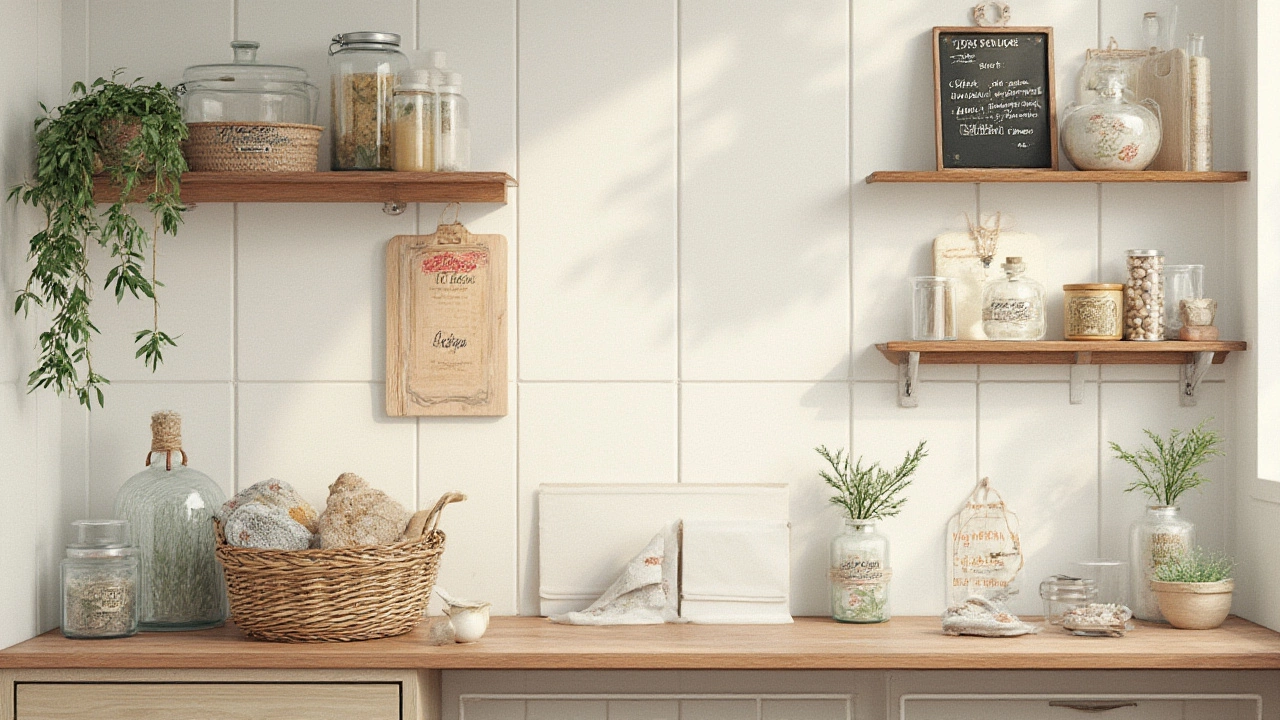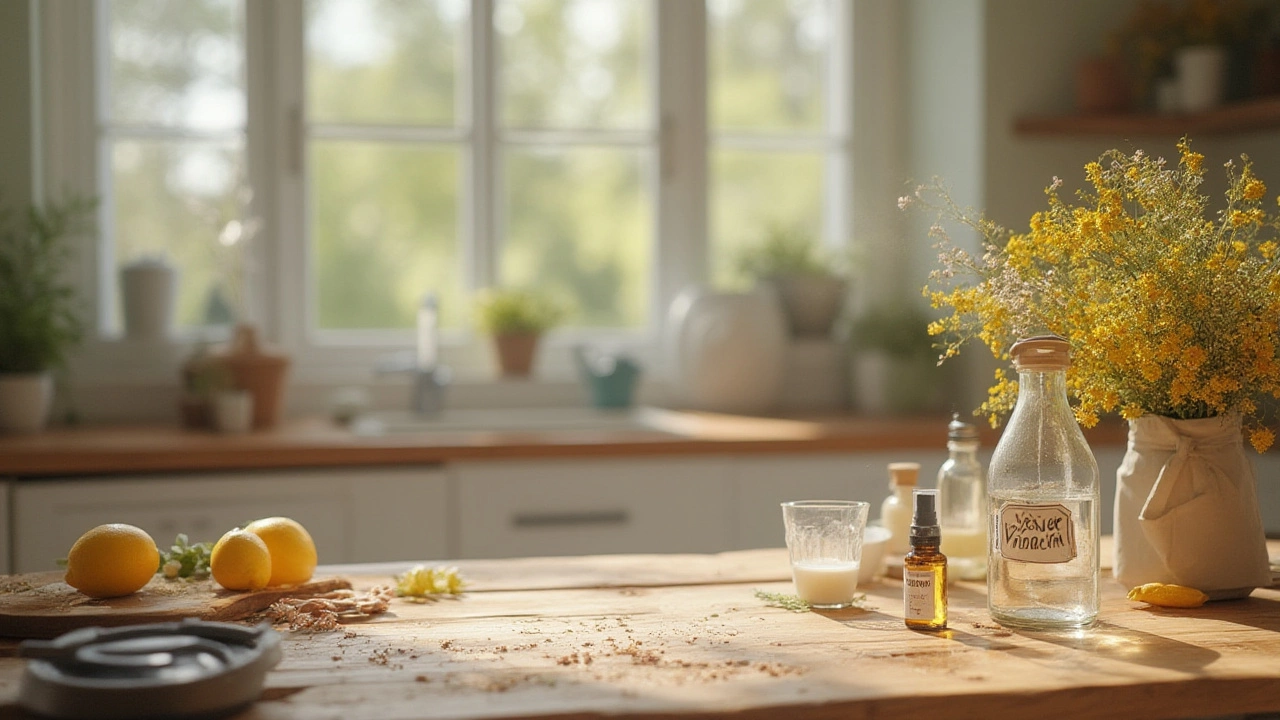Stop and think for a second—have you ever actually flipped that plastic cleaner bottle around and read the label? Try pronouncing those ingredients out loud. Suddenly, it feels weird to spray all that unknown stuff around your kitchen. The truth is, you don’t need a chemistry degree to get your house clean—or to know what you’re breathing in while you mop up. Natural all-purpose home cleaners aren’t just a trend; they’re a real option, and honestly, they work. No need for a cupboard crammed with a spray for every surface. The right mix of things like vinegar, baking soda, and a few drops of oil can handle nearly any mess. Nature has solutions for sticky fingerprints, greasy stoves, and bathroom odors—sometimes, it just takes a little know-how.
What Exactly Is a Natural All-Purpose Home Cleaner?
Think of a natural all-purpose home cleaner as a multitool for your cleaning needs. It’s a cleaning solution made from ingredients found in nature or derived with minimal processing. These are formulas without harsh chemicals, synthetic fragrances, or toxic additives. There’s no point in making your house smell like a hospital if you can kill 99% of the bacteria with vinegar and lemon juice. The whole point is to get the same shine and germ-killing power, minus the headaches, allergies, and the guilt of flushing harsh stuff into the drains.
A truly all-purpose cleaner should be safe on most surfaces: floors, kitchen counters, bathroom sinks, and even inside the fridge. Often, these formulas are based on simple, familiar ingredients. The most common are distilled white vinegar and baking soda—sometimes both, although not mixed together unless you want a volcano. Vinegar has acetic acid, which is a natural bacteria killer and degreaser. Baking soda is a gentle abrasive that scrubs away stuck grime. Add some natural soap (like unscented castile soap), and you’ve basically covered all daily messes.
Here’s a look at what’s in popular supermarket cleaners versus natural homemade ones:
| Ingredient | Supermarket Cleaner | Natural Cleaner |
|---|---|---|
| Main Cleaner | Sodium Lauryl Sulfate | Vinegar or Baking Soda |
| Fragrance | Artificial Fragrance | Essential Oils (optional) |
| Preservative | Formaldehyde Derivative | None/Minimal (e.g., salt) |
| Antibacterial Agent | Triclosan | Acetic Acid (Vinegar) |
| Color | Artificial Dye | None |
Plenty of people question whether a simple vinegar spray really cuts it versus those neon liquids. Turns out, studies from the National Sanitation Foundation have found that vinegar kills about 80% of germs and nearly all molds—good enough for everyday cleaning outside hospital settings. Lemon juice kicks it up a notch, adding both scent and extra antibacterial power thanks to citric acid.
Why Choose Natural Over Conventional?
Why bother switching if commercial cleaners do the job? Plenty of reasons. For one, everything you clean off eventually makes its way into your skin, your lungs, and sometimes your food. Kids crawling on floors pick up residue. Pets lick surfaces. Your “clean” coffee table might have a thin film of ammonia or fake lime scent right where you set down your chips. That’s not just paranoia—studies in 2022 out of the Environmental Working Group found that indoor air is almost always more polluted than outdoor air, mostly due to standard cleaning products.
Then there’s allergies. About 11% of adults are allergic to at least one typical cleaning-chemical ingredient, like formaldehyde, parabens, or synthetic fragrances. That’s a lot of sniffling and rashes that could be solved simply by switching to something non-toxic. Kids and pets are even more sensitive—animals have smaller lungs and get a bigger dose of fumes with every sniff.
Natural ingredients are also friendlier to the planet. Commercial cleaners are packed with compounds that don’t break down easily. When you pour them down the drain, they head straight for the water supply, where they make life difficult for plants, fish, and wildlife. Vinegar, on the other hand, gets neutralized by nature within hours. Baking soda dissolves and poses no threat. You make less waste, too—reuse one spray bottle forever instead of tossing endless plastic bottles in the trash.
The economics are hard to argue with, too. If you grab a basic store-bought cleaner, you’re likely spending $3–$8 every single time—more if you want something labeled “eco-friendly.” Meanwhile, a gallon of vinegar runs about $2 and makes more cleaner than most people could use in a year. Baking soda? Just over a buck. If you like a nice scent, a bottle of essential oil gets you dozens of batches with just a few drops per spray bottle. Say goodbye to that cluttered cabinet and stop wasting money on bottles designed to stand out on a store shelf, not on results.

Common Ingredients and How They Work
Alright, so what goes in a true natural home cleaner? There’s real science to this. Here are the all-stars, each with a simple, proven job:
- Vinegar: Acetic acid dissolves mineral deposits, breaks down sticky residues, fights bacteria, and neutralizes odors. Only downside—don’t use on marble or granite; it can etch the stone.
- Baking Soda: Sodium bicarbonate is a mild abrasive. Scrubs without scratching porcelain, tile, and many plastics. Absorbs odors, helps lift stains, and deodorizes.
- Castile Soap: Pure vegetable-based soap (like Dr. Bronner’s) cuts grease and lifts away dirt. Works on counters, tubs, even as a gentle floor wash. Doesn’t leave harmful residue.
- Lemon Juice: Contains citric acid, which kills germs, dissolves limescale, and makes everything smell fresh. Good for glass, stainless steel, or in the sink trap.
- Hydrogen Peroxide (3%): An effective, no-odor disinfectant. Kills mold, mildew, and germs. Great in bathrooms and kitchens, but store in a dark spray bottle—it breaks down in light.
- Salt: Excellent for tough scrubbing, plus it draws moisture out of bacteria and helps with deodorizing stained surfaces.
- Essential Oils: Not required, but pure oils like tea tree, eucalyptus, or lavender add antimicrobial power and a natural scent—without fake perfumes or chemical fixatives.
Let’s break down how to actually mix up a batch. Here’s a starter recipe that covers 99% of surfaces:
- 2 cups distilled white vinegar
- 2 cups water
- 1 tablespoon baking soda (mix carefully so it doesn’t fizz over!)
- 10 drops essential oil (optional—try lemon, tea tree, or lavender)
Shake it up in a sturdy spray bottle, and you’ve got a reliable natural home cleaner ready for almost any task. For greasy jobs—like stove tops—add a squirt of unscented castile soap. For glass, skip the baking soda. For tough soap scum, a paste of baking soda and water does wonders. The best cleaners are the blends you actually use because they’re fast, safe, and flexible.
Tips, Troubleshooting, and Unexpected Uses
So, you’ve made your own cleaner—what next? First, label your bottle. Homemade stuff can look confusing sitting next to the olive oil or dish soap, especially if you’ve gone full DIY. Store your new cleaner out of direct sunlight, as both vinegar and essential oils can degrade over time. If you make a larger batch, give it a quick shake every few days; separation is natural.
Some pro tips you won’t get on the back of a Lysol bottle:
- Don’t use vinegar on marble, granite, or natural stone surfaces. It’s too acidic and will cause dullness or damage. For those, stick to warm water and a splash of castile soap.
- Test on a small, hidden spot before going all-in if you’re cleaning painted surfaces, wood, or anything delicate.
- If you want streak-free mirrors and windows, skip the baking soda and add a tablespoon of cornstarch. It makes the glass crazy clear (weird, but true).
- For sticky labels or goo, a paste of baking soda and olive oil will lift off the mess without scratching the surface.
- Hydrogen peroxide is great for mold, but don’t mix it with vinegar in the same bottle. Each works on its own, but together they form peracetic acid, which is much harsher.
- Citrus peels aren’t just compost—toss orange or lemon peels into a jar with vinegar and let it sit a week. Strain, and you’ve got a citrus-infused cleaner that smells uplifting and boosts cleaning power.
- For smelly garbage cans or sneakers, sprinkle a little dry baking soda as a deodorizer, then vacuum up after an hour.
Natural cleaning isn’t only about saving money (though it’s nice). It’s about making your home less toxic, more welcoming, and safer for anyone visiting or living there—fur, feather, or human. With ingredients straight from the pantry or supermarket shelves, you’ve got tools to tackle almost anything: spilled wine, sticky syrup, kitchen grease, toilet rings, pet messes, mystery stains, and more.
If you want to up your game, keep these combinations handy:
| Problem | Best Natural Cleaner |
|---|---|
| Greasy Stove | Vinegar + Castile Soap |
| Glass & Windows | Vinegar + Water + Cornstarch |
| Shower Mold | Hydrogen Peroxide (3%) |
| Carpet Stains | Baking Soda + Vinegar |
| Deodorizing Fridge | Baking Soda (Open Container) |
Bet you didn’t expect a handful of pantry items to outdo all those bottles under the sink. Once you try it, there’s no going back—your lungs, wallet, kids, and the planet will all appreciate it.
